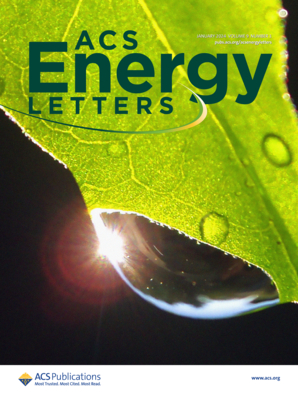Post-Treatment Free Yttrium Phosphotungstate Anode Interfacial Material for Organic Solar Cells with 20.55% Efficiency
IF 19.3
1区 材料科学
Q1 CHEMISTRY, PHYSICAL
引用次数: 0
Abstract
Hole transport layers (HTLs) play a crucial role in organic solar cells, yet achieving high performance while maintaining simple processing requirements remains challenging. Here, we report a facile strategy utilizing yttrium-doped phosphotungstate (YPWO) as an efficient HTL material, prepared through a straightforward solution process without requiring post-treatment. The incorporation of yttrium enhances molecular stacking and reduces defect states, resulting in improved charge transport properties and suppressed recombination losses. YPWO-based devices achieve a power conversion efficiency (PCE) of 20.55% (certified efficiency of 20.30%), attributed to optimized energy level alignment, reduced trap states, and improved charge carrier mobility. Additionally, YPWO demonstrates thickness tolerance and compatibility across various photovoltaic systems, achieving PCEs exceeding 19% with different photoactive layers. This work presents a viable strategy for developing efficient HTL materials, offering a practical pathway toward commercially viable organic solar cells through simplified processing.

用于效率为 20.55% 的有机太阳能电池的无后处理磷钨酸钇阳极界面材料
本文章由计算机程序翻译,如有差异,请以英文原文为准。
求助全文
约1分钟内获得全文
求助全文
来源期刊

ACS Energy Letters
Energy-Renewable Energy, Sustainability and the Environment
CiteScore
31.20
自引率
5.00%
发文量
469
审稿时长
1 months
期刊介绍:
ACS Energy Letters is a monthly journal that publishes papers reporting new scientific advances in energy research. The journal focuses on topics that are of interest to scientists working in the fundamental and applied sciences. Rapid publication is a central criterion for acceptance, and the journal is known for its quick publication times, with an average of 4-6 weeks from submission to web publication in As Soon As Publishable format.
ACS Energy Letters is ranked as the number one journal in the Web of Science Electrochemistry category. It also ranks within the top 10 journals for Physical Chemistry, Energy & Fuels, and Nanoscience & Nanotechnology.
The journal offers several types of articles, including Letters, Energy Express, Perspectives, Reviews, Editorials, Viewpoints and Energy Focus. Additionally, authors have the option to submit videos that summarize or support the information presented in a Perspective or Review article, which can be highlighted on the journal's website. ACS Energy Letters is abstracted and indexed in Chemical Abstracts Service/SciFinder, EBSCO-summon, PubMed, Web of Science, Scopus and Portico.
 求助内容:
求助内容: 应助结果提醒方式:
应助结果提醒方式:


